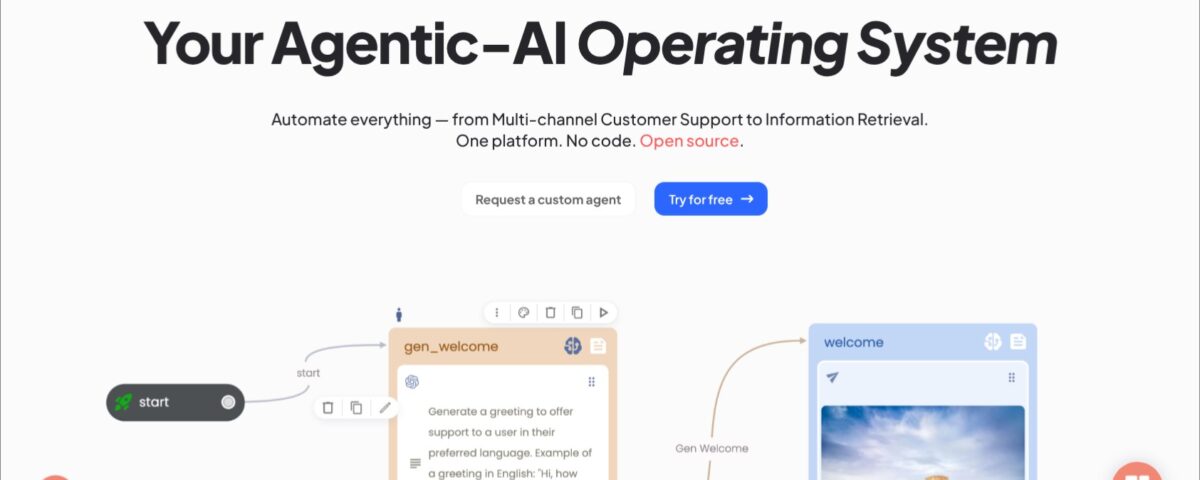Tiledesk
Tiledesk is an open-source, no-code platform designed for building AI-powered chatbots and automating workflows across multiple channels like web, WhatsApp, email, and voice. It enables users to create conversational agents that handle customer support, information retrieval, and batch processing tasks. The platform includes features such as visual flow builders for designing interactions, knowledge base integrations for accurate responses, and deployment options for various channels. It supports agentic AI with prompt chains and multiple specialized agents that collaborate based on user intent.
Key technical aspects include hybrid search combining full-text and semantic methods for better query handling, retrieval-augmented generation for context-enhanced answers, and self-learning capabilities that update knowledge from interactions. Human-in-the-loop functionality allows seamless escalation to live agents with full context, while AI Copilot provides real-time assistance to human operators. On-premises deployment ensures data control, and it integrates with open models like LLAMA and Mistral.
Compared to competitors such as Zendesk and Intercom, Tiledesk offers more affordable general pricing with a free trial and flexible plans suited for startups, though it may require more setup for advanced customizations. Users report high usability and effective automation, but note occasional performance lags. The platform serves industries like manufacturing, education, and e-commerce with tailored solutions.
Specific features encompass multi-channel support, email ticketing that builds from historical threads, and e-commerce assistants that sync with stores like Shopify. Analytics via LLM tags help monitor trends, and the embedded debugger aids in real-time troubleshooting. Open-source nature allows for extensions and community contributions.
Practical applications include automating appointment scheduling, managing inbound and outbound WhatsApp messages, and enhancing customer resolution times. To implement effectively, begin with the 14-day trial to test basic automations before scaling to complex workflows.
Video Overview ▶️
What are the key features? ⭐
- Design Studio: Enables no-code creation of conversational flows and AI agents for tailored interactions.
- Knowledge Base Integration: Connects documents and data sources to provide accurate, context-aware responses via AI.
- Multi-Channel Support: Deploys agents across web, WhatsApp, email, voice, and social platforms for consistent engagement.
- Prompt Chains: Breaks complex tasks into reusable sequences for efficient workflow orchestration without coding.
- Human-in-the-Loop: Facilitates seamless handoffs from AI to human agents with full conversational context.
Who is it for? 🤔
Examples of what you can use it for 💭
- Customer Support Teams: Automate routine inquiries across channels to resolve issues faster and escalate complex cases seamlessly.
- E-commerce Owners: Integrate with stores to handle product questions, build carts, and convert conversations into sales.
- Manufacturing Operators: Streamline workflows with real-time alerts and inventory management using AI agents.
- Educational Institutions: Provide self-service support for students and citizens with personalized, secure responses.
- Healthcare Providers: Offer 24/7 patient assistance for symptom info and appointment bookings without wait times.
Pros & Cons ⚖️
- Ease of use
- Affordable pricing
- Multi-channel integration
- Open-source flexibility
- Occasional lags
- Learning curve for advanced features
FAQs 💬
Related tools ↙️
-
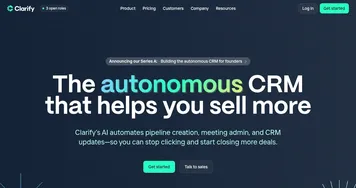 Clarify
Unifies customer data, automates tasks, and provides actionable insights for sales teams
Clarify
Unifies customer data, automates tasks, and provides actionable insights for sales teams
-
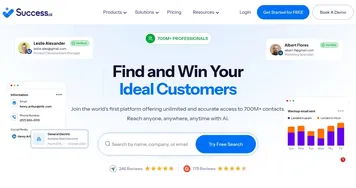 Success.ai
An AI tool designed to help businesses find and connect with potential customers
Success.ai
An AI tool designed to help businesses find and connect with potential customers
-
 SearchAtlas
An all-in-one SEO platform designed to boost your website's visibility on search engines
SearchAtlas
An all-in-one SEO platform designed to boost your website's visibility on search engines
-
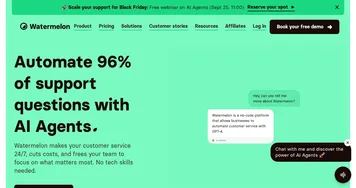 Watermelon
Automates customer support with AI agents, streamlining FAQs and reducing workload
Watermelon
Automates customer support with AI agents, streamlining FAQs and reducing workload
-
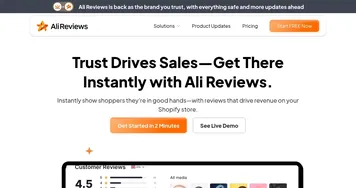 Ali Reviews
Imports and displays quality product reviews on Shopify stores to boost trust and sales
Ali Reviews
Imports and displays quality product reviews on Shopify stores to boost trust and sales
-
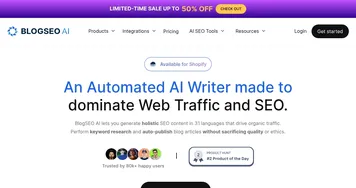 BlogSEO AI
Generates SEO-optimized blog content automatically in multiple languages
BlogSEO AI
Generates SEO-optimized blog content automatically in multiple languages

